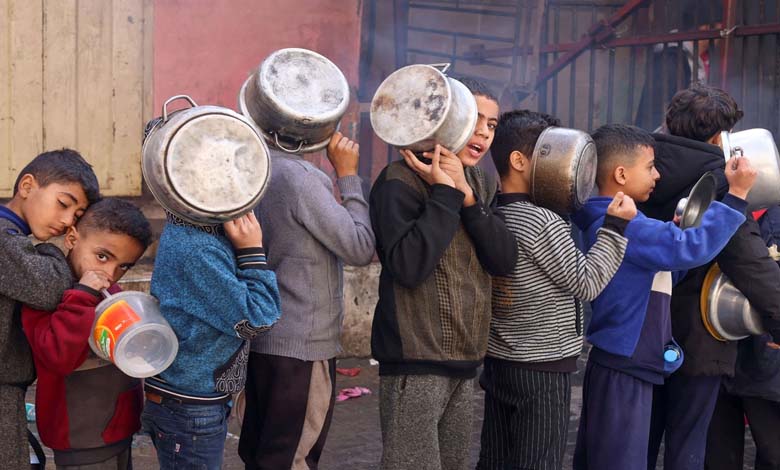Famine haunts two million Palestinians in Gaza amid a destructive war
A United Nations report confirms that the percentage of families affected by a severe food security crisis in Gaza is the highest ever recorded globally

The people of Gaza face famine due to the war and the blockade imposed by Israel, despite international efforts to alleviate the suffering of Palestinians, which are met with rejection from the Israeli state and its allies.
A committee supported by the United Nations stated in a report published on Thursday that all of Gaza’s 2.3 million inhabitants are facing levels of hunger crisis and the risk of famine that increase every day. The report from the Integrated Food Security Phase Classification Committee noted that the percentage of families affected by a severe food security crisis in Gaza is the highest ever recorded globally.
The humanitarian situation in Gaza has rapidly deteriorated since Israel launched a massive military operation on October 7th, destroying large areas of the coastal region in the following weeks. The Israeli operation was in response to a surprise incursion by the Palestinian Islamic Resistance Movement (Hamas) into southern Israel.
Trucks carrying aid from Egypt have delivered some food, water, and medicine, but the United Nations says that the quantity of food is only 10 percent of what the population in the area, most of whom are displaced, needs. The Integrated Food Security Phase Classification Committee for Gaza stated, “There is a risk of famine that increases every day as the current situation persists or worsens due to intensified violence and restrictions on the entry of humanitarian aid.”
Military operations, aid inspection operations demanded by Israel, communication breakdowns, and fuel shortages have hindered aid distribution in Gaza. Some desperate residents of Gaza have been reported attempting to seize scarce food supplies and other goods from aid trucks. There are also reports of people resorting to eating donkey meat, and anecdotal accounts of patients seeking medical assistance.
Arafat Hussein, a senior economic expert and research director at the World Food Programme, said, “This report confirms to some extent our worst fears,” describing the crisis as “unprecedented.” He added in an interview, “I’ve been doing this for the last twenty years or more. I’ve been to Afghanistan, I’ve been to Yemen and to Syria and South Sudan and Ethiopia and northeast Nigeria. But I have never witnessed such a rapidly unfolding situation of this magnitude.”
The Integrated Food Security Phase Classification Committee, a partnership of United Nations organizations and non-governmental organizations, uses complex technical standards as the global benchmark to determine the severity of a hunger crisis. The committee emphasizes that a crisis or Level 3 of hunger signifies that families are suffering from high rates of acute malnutrition or can only meet minimum needs through crisis coping strategies or consuming essential assets. The committee’s most severe warnings are at Level 5, which includes catastrophe and famine.
The committee concluded that at least one in four households, or 577,000 individuals, in Gaza is already facing catastrophic hunger, experiencing severe food shortages, starving, and depleting coping capacities. Hussein stated that this is four times more than the estimated number facing catastrophic hunger in other parts of the world.
In Sudan, the committee estimates that war has pushed about 37 percent of its population to Phase 3 or hunger crisis levels, and 10% of the population is facing Phase 4, which is the “emergency” level. In South Sudan, the committee found that 46 percent of the population faced hunger crisis levels in the past few months, while the committee’s estimate in Afghanistan is 29%.
Famine has been declared only twice over the past twelve years, in parts of southern Somalia in 2011 and in parts of South Sudan in 2017. Hussein commented on the situation in Gaza, stating, “If the war continues in the current manner, and if aid does not enter as it should, we will witness a famine in the next six months.” He added, “Whatever happens in two months or if it happens in three months, it will be difficult to predict.”












